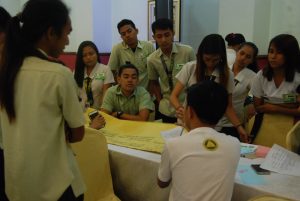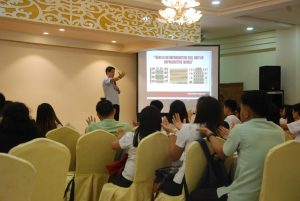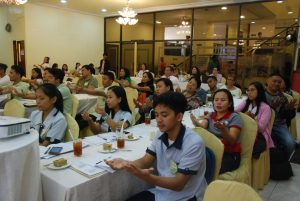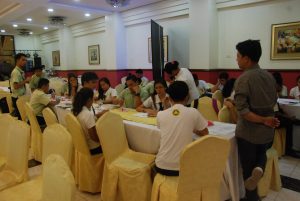NAGA CITY—“Who wants to pursue a course in agriculture or go into farming?” farmer-scientist Ramon Peñalosa asked the more than 160 students and representatives of government agencies on September 26, 2018 during the #Youth4Agri Forum held at Villa Caceres Hotel here.
Less than 10 students raised their hands.
Two of these students—17-year old Mark C. Bedes of Camarines Sur National High School here and 21-year old Ferdinand Demanarig of Buhi said that farming is their way to improve the lives of their families.
Bedes, whose parents sell vegetable in Naga City Public Market, plans to have a vegetable farm so that he can supply his parents with his produce. His parents buy their vegetables from local traders. He wants to be an “agri-preneur”
Demanarig, on the other hand, wanted to develop their family’s four-hectare coconut farm in Buhi, Camarines Sur by incorporating livestock and poultry animals. He believes that developing their farm will augment their family’s income.
Peñalosa who is a pioneer of organic farming in Negros Occidental said that the easiest way to be a millionaire is to go into agriculture.
He presented several options in earning millions in farming. With a 10sqm area for Japanese Seattle Quail Production, one can earn as much as Php810,000.00 per year. With 20sqm area for Oyster Mushroom Production, one can earn as much as ₱ 2.16M per annum. With 500sqm area for Brown Decalb Table Egg Production, one can earn as much as 5.7M per year.
PhilRice Senior Science Research Specialist Jaime Manalo IV that in order to engage the youth into agriculture, their office introduced The InfoMediary Campaign. He said that a school is the nucleus of agricultural extension.
Meanwhile, Louise Mabulo, founder of The Cacao Project shared that agri-preneurship is not only about making money, but having social impact. She encouraged the students to engage in agri-business because the population is continuously increasing but the area for food production is decreasing.
She also added that majority of wealthy Biblical personalities in the Old Testament were farmers.
Candon City Councilor and founder of Candon Youth Movement Joanne Valdez discussed Youth in Leadership and Community Development. She shared that the members of the CYM assisted senior farmers by introducing the Modified Dapog Technology. Through close coordination with the farmers, they were able to increase their harvest from four tons to nine tons per year per hectare.
“The next frontier is agriculture. Kahit magyabang ka sa mga awards and certificates mo, at the end of the day, kakain ka pa rin,” said Jim Cano of the Young Professionals for Agricultural Development. He said that there is a bright career path with agriculture. With the growing population, there is demand for food production.
Agriculture is more than farming. It is PERFFECT (Policy, Education, Research, Finance and Farming, Extension, Communication and Technology). Cano added that there is a broad field in agriculture.
According to the Commission on Higher Education, only 119,498 students are enrolled in agri-fishery courses out of 3.8M enrolled college students in the country.
Thus the lack of interest in agriculture of the younger generation, the insufficient participation of youth in agricultural policy dialogues and inadequate access to technologies will create a great gap between the youths and agriculture.
Engr. Andrew Morano of Morestate Corporation discussed Food and Agri-Business opportunities in the industry. He cited that in order to be successful financially, agribusiness is the key.
After the last discussion, Central Bicol State University of Agriculture Research Director Arthur Estrella reiterated the question of Peñalosa to the participants from Department of Agriculture, PhilRice, CBSUA, Municipal Agriculturists of Baao, Bula, Sipocot and Naga City, Baao National High School, Unibersidad de Santa Isabel, Naga City Science High School, and Tabaco National High School.
This time, majority of the students raised their hands up. (jaysonmgonzales with photos by Emil Pasumbal)




